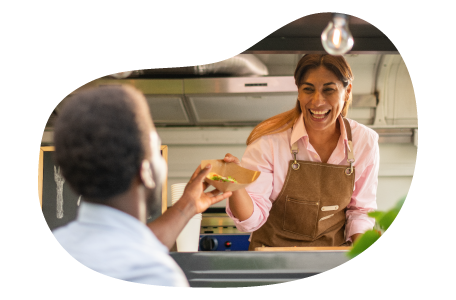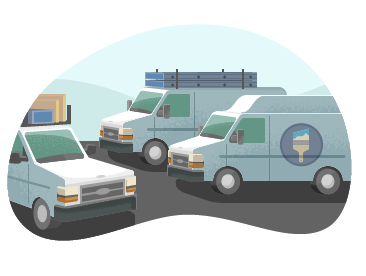
Why do food trailers need insurance?
Your food trailer attracts a wide array of customers, but that can bring many risks. A child could get injured in an accident involving your vehicle, or someone could become ill after eating your products. Food trailer insurance can help pay for the resulting medical bills or legal costs. It can also cover damage to your trailer due to vandalism or severe weather.

Get same-day insurance
With Insureon, food trailer owners can get insurance coverage the same day they apply for quotes, offering instant peace of mind.
Fill out our easy online application to compare quotes from top-rated providers.
What business insurance do you need for a food trailer?
These insurance policies cover the most common risks for food trailers.
Business owner’s policy
A business owner's policy (BOP) is an affordable way for owners of food trailers and other mobile food trucks to buy commercial property insurance and general liability coverage together.
- Customer bodily injuries
- Damaged business property
- Business interruption insurance
Workers’ compensation insurance
Most states require workers' comp for food trailer businesses that have employees. It also protects sole proprietors from work-related medical costs that health insurance might deny.
- Medical expenses from employee injuries
- Disability benefits
- Legal fees from work-related injuries
General liability insurance
Commercial general liability insurance covers common third-party risks, such as a claim that a child became ill after eating a sandwich you sold. It's required for most commercial leases.
- Slip-and-fall accidents
- Damaged customer property
- Product liability coverage
Commercial auto insurance
A commercial auto policy covers financial losses from accidents involving your food trailer, including customer injuries if someone gets too close. Each state has its own auto insurance requirements.
- Medical bills from an accident
- Property damage from an accident
- Vehicle theft and vandalism
Liquor liability insurance
This policy covers legal fees, property damage, and medical costs if your food trailer serves alcohol to a visibly intoxicated person who then proceeds to harm others.
- Injuries caused by intoxicated patrons
- Property damage caused by intoxicated patrons
- Legal defense costs
Cyber insurance
Also known as cyber liability insurance, this policy helps food trailers and food vendors recover from costly cyberattacks and data breaches, such as a ransomware attack.
- Data breach notification costs
- Fraud monitoring services
- Cyber extortion payments
Does my food trailer need commercial auto insurance?

Food trailers that purchase commercial auto insurance often:
- Have a vehicle titled to their business
- Drive to and from worksites
- Carry supplies, equipment, or products used for work
- Transport employees
- Rely on delivery drivers or couriers
Check the laws in your state to see when coverage is required.
How much does food trailer insurance cost?

A single food trailer that covers only a few suburbs will cost less to insure than a larger business.
Factors that can affect the cost of food truck insurance or food trailer insurance include:
- Services offered by your food trailer business, such as event catering
- Types of food and beverages you sell
- Value of your trailer, freezers, and other property
- Where your business operates
- Types of insurance and add-ons purchased, such as additional insureds
- Policy limits and deductibles
- Coverage options, such as physical damage insurance or comprehensive coverage for your trailer
How do I get food trailer insurance quotes?
It's easy to get food trailer insurance or food truck insurance if you have your company information on hand. Our application will ask for basic facts about your business, such as revenue and number of employees. You can buy a policy online and get a certificate of insurance with Insureon in three easy steps:
- Complete a free online application.
- Compare quotes from top insurance companies and choose a policy.
- Pay for your policy and download a certificate.
Insureon's licensed insurance agents work with top-rated U.S. providers to find the right insurance coverage for your food trailer business, whether you work independently or hire employees.
Verified business insurance reviews
Hear from customers like you who purchased small business insurance.
FAQs about business insurance for food trailers
Review answers to common questions about food trailer insurance policies.
Do I need a license to run a food trailer in my state?
There are several types of licenses and permits you might need in order to launch a food trailer or food truck business. That includes:
- Business license: States, counties, and cities typically require a business license for you to operate legally. If your route takes you through different jurisdictions, you may need multiple licenses. Fortunately, it's fairly easy to get a business license.
- Food handlers card: Anyone who makes or serves food needs a food handlers card. The exact requirements vary by state, but you and your employees will typically need to attend a food safety training course and pass an exam on the topic.
- Health permit: Your trailer must pass an inspection conducted by your local health department and pay an application fee.
- Commercial driver's license (CDL): In most cases, a driver's license is sufficient. But if your trailer or truck weighs more than 26,000 pounds, you'll need a CDL to drive it.
Food trailer or food truck owners might also need a seller's permit, a mobile food license, a mobile service permit, or a parking permit. In addition, cities have different regulations regarding parking, noise levels, or even whether food trailers are permitted. It's worth doing some research to make sure you're in compliance and to avoid fines.
Will insurance protect mobile food trailer equipment?
Yes, you can buy business insurance policies that protect your food trailer freezers, generators, and other property in transit from fires, theft, and other losses. This is important coverage to have, as commercial property insurance only covers items at your primary business location.
The type of equipment and its value determine which policy you need. For a food trailer business, you might need:
- Tools and equipment insurance: This policy insures mobile tools and equipment valued at less than $10,000. The items typically must be less than five years old.
- Inland marine insurance: For more valuable business equipment, you'll need inland marine insurance. It'll pay for costs if a malfunctioning generator causes a fire in your trailer, destroying your freezers and inventory.
- Cargo insurance: This policy covers the risks of transporting goods. For instance, it'll help pay to replace a shipment of ingredients that was destroyed in an auto accident.
These policies are all different types of inland marine insurance. They're sometimes called "floater" policies because they provide protection for property that moves from place to place.
Does food trailer insurance provide coverage for special events?
Yes, you can buy special event insurance that covers activities beyond your everyday food trailer route. Venues and clients might ask you to carry this coverage as part of the terms of a contract.
Basically, event insurance extends the protection of general liability insurance to special circumstances like a festival, carnival, or wedding. For example, one of your regular customers might invite you to cater their child's birthday party. Because this introduces liabilities not typically faced by your business, you'd need a special event policy to make sure you're covered.
As with a general liability policy, special event insurance covers accidents that injure a customer or damage someone's property. If you include cancellation insurance, you can also get reimbursed for lost deposits and other fees related to the cancellation or postponement of an event.
What other kinds of insurance do I need for a food trailer business?
Owners of food trailers and other food service businesses should consider the following types of coverage to protect against their unique risks and liabilities:
- Commercial property insurance: This policy covers business property at your primary location, including your building if you own it. Property coverage protects against financial losses from fires, storms, and burglaries.
- Hired and non-owned auto insurance (HNOA): Your personal auto insurance won't cover business-related driving, which is why food trailers need additional coverage. This policy provides auto liability coverage for personal, leased, and rented vehicles used for work purposes, such as a leased food trailer.
- Commercial umbrella insurance: Umbrella insurance boosts the protection of your general liability, employer's liability, and commercial auto coverage, activating when the limit is reached on your food business's underlying policy.
- Equipment breakdown coverage: This policy covers the cost of replacing a generator, freezer, point-of-sale device, or other piece of equipment that breaks down unexpectedly. In the event of a freezer malfunction, you'll also need food spoilage coverage to replace the inventory that had to be thrown away.
